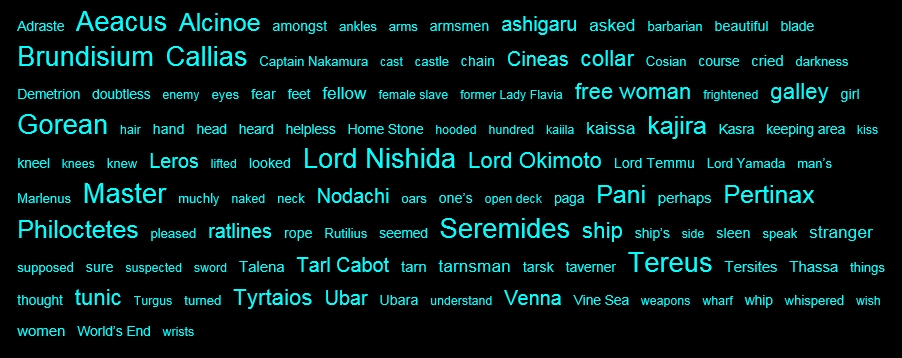


|
| ||
|
|
|
|
|
|
SILVER EDITION

|


|
SILVER EDITION |
|
Publication History
Cover Overview |
Reviews and Previews
Chapter Overview |
Word Cloud
[NEW]
First Chapter Preview [NEW] |
Cover Gallery (year)
Cover Gallery (edition) |
 Cover Overview
Cover Overview



 Reviews
Reviews Chapter Overview
Chapter OverviewHere is an overview of the 37 chapters in Mariners of Gor:
|
1. Late One Night, in a Tavern in Brundisium
2. This Occurred Betwixt Cos and Tyros 3. I am Interviewed; What Occurred Prior to my Interview; I Have Renewed an Acquaintance 4. I am Interviewed; My Fate is to be Soon Decided 5. What Occurred on the Main Deck of the Great Ship; Tersites; A Storm is Imminent 6. The Farther Islands Fall Astern 7. We Man the Pumps; There is Unease Amongst the Men; We are Spoken to by Tyrtaios 8. The Ice; I Hold Converse with a Slave; Rations Grow Short; I Consider the Matter of Seremides 9. The Mutiny 10. After the Mutiny 11. Parsit 12. I am Set Upon; The Deck Watch; A Light 13. We Board an Unusual Ship; The Mystery of the Parsit is Solved; There is Evidence our Presence has been Noted 14. The Tharlarion; Two Galleys are Lost; I Find Myself Alone with Seremides 15. Seremides; The Slave, Alcinoë 16. The Warning Ship; The Small Boats; Assassins; The Fleet of Lord Yamada 17. The Floating Stones; Unusual Precautions are Taken; I Converse with Tarl Cabot 18. I Converse with a Slave 19. The Great Ship is Tested; I Have Beheld the Formation of Islands |
20. It is Suspected that Land is Nigh; Many Slaves are Allowed the Liberty of the Deck; I Take the Opportunity to Interrogate a Particular Slave; No Cry of Interest Had Yet Emanated from the High Watch
21. I Fear Disorder; The Signal; Slaves are Returned to their Mats 22. What Occurred on the Beach 23. I First See the Castle of Lord Temmu; Landfall Will Be Made 24. We Have Made Landfall; We Shall Approach the Castle of Lord Temmu 25. I Introduce Two Slaves to One Another 26. What Occurred in the Courtyard of the Castle of Lord Temmu 27. The Victory of the Exploratory Force; There Will Be Feasting 28. In the Hall of the Three Moons; What is Seen from the Parapet; I Descend from the Parapet 29. What Occurred at the Gate 30. How the Desertion Failed of Its Purpose; I Realize the Danger Which is Not Spoken 31. I Fail to Satisfy the Curiosity of Seremides 32. Lines are Severed; Torches Fall Into the Sea 33. It is Now Morning in Brundisium 34. A Scribe’s Interlude 35. The Wharfing of an Unusual Ship 36. The Warehouse; The Encounter with Cineas, the Agent of Tyrtaios; The Gift of Lord Nishida and Tarl Cabot, Tarnsman 37. A Scribe Concludes an Account |
 Word Cloud
Word CloudThe image below shows the most often used words and terms within Mariners of Gor. The larger the size, the more often the word or term occurs in the text.

 First Chapter Preview
First Chapter Preview
Chapter One
Late One Night, in a Tavern in Brundisium
And he spoke.
“I sailed on the great ship,” he said. “Yea, the ship of Tersites.”
“It was lost at sea,” said a man.
“It sailed over the edge of the world,” said another.
“Listen,” he said. “And I will tell you a story.”
“For paga,” laughed a Merchant.
“We have heard such stories,” said a fellow.
“You are a liar,” scoffed the taverner.
“A thousand ships come and go, in the great harbor of Brundisium,” said a fellow. “There are a thousand stories.”
“But not of the ship of Tersites,” he said.
“No,” said a fellow, “not of the ship of Tersites.”
“There is no such ship,” said a man. “Tersites was mad, fled from Port Kar.”
“I hear ‘banished’,” said another.
“The ship was never built,” said a man.
“It was built,” averred the fellow.
“No,” said a man.
“In the northern forests,” he said.
“Absurd,” laughed a man.
“And debouched onto Thassa from the Alexandra,” he said.
“Have you seen it?” asked a man.
“I berthed upon her,” he said.
“Liar,” said the taverner.
“What happened?” asked a man.
“That is my story,” said the man.
It was a small tavern, The Sea Sleen, only yards from the water, declining by a steep slope to the southern piers. It was late. Tharlarion-oil lamps hung on their slender chains, three to a lamp, adjusted variously, table to table, from the low, beamed ceiling. Most had been extinguished, as tables were vacated. The few lamps remaining alit put out little light, the wicks shortened to conserve fuel. There were no musicians. The dancing sand was empty. Given the nature and paucity of its custom, The Sea Sleen could afford to hire musicians only at the height of the season. It was now the second month in autumn, called in Brundisium the month of Lykourgos. The harbor was not now much trafficked. Mostly coasting. Until the arrival of the stranger, it had been muchly quiet. One might have heard the clink of a goblet now and then, the scraping of a wooden trencher on a low table, sometimes the crack of a kaissa piece being struck down on a board in an aggressive move. Outside, away from the portal, down the slope a bit, if one listened, one could hear the water lapping against the pilings, where the vast glory of looming Thassa, in the darkness, deigned to touch the small works of men. The Sea Sleen was not one of the higher, larger taverns in the great port of Brundisium, such as that of the Diamond Collar, the Joys of Turia, the Dina, the tavern of Chang, that of Hendow, or such. Her patronage was mostly that of ruffians, mariners between voyages, their coins now mostly spent, left in the higher taverns, drifters, wanderers, peddlers, exiles, some mercenaries, willing to unsheathe their blades for a bit of silver, or a fight. The stranger sat cross-legged at one of the small tables. Several were gathered about him. One could not see his face well in the half-darkness, but the reddish outline marked his place. Most of those about him were muchly in darkness. Some held cups of paga. The trenchers had been gathered in, and the kaissa boards had been folded and put away, the red and yellow pieces in two shallow drawers, fixed in the board, one on each side, one for each color. This is not an unusual arrangement in taverns. Commonly, however, kaissa boards are simple, straight boards, and the pieces are kept separately, in boxes or sacks. Members of the Caste of Players are recognized by their red-and-yellow-checked robes, the worn board slung over their shoulder, the sack of pieces at their waist. Depending on the Player, they will give you a game for as little as a tarsk-bit, as much as a golden tarn disk of Ar. It was said that Centius of Cos had once played in Brundisium.
“If you have a story to tell, for a drink,” said the taverner, “why not tell it toward the upper city, against the outer walls, in a landward tavern, say, the Diamond Collar?”
The stranger was silent. Then he said, “I want paga.”
“I will tell you,” said the taverner. “You were ejected elsewhere, thrown into the streets, and stumbled downward, bewildered, blindly, mad, knowing nothing else, stumbling from door to door, until you would reach the piers.”
“And then Thassa, dark, cold Thassa,” said a man.
“Paga,” said the stranger.
“Do you beg?” inquired the taverner.
“No,” said the stranger, and the taverner, alarmed, sensing danger, stepped a bit back, but recovered himself, almost immediately.
The stranger was a large, spare man, with roughened hands, perhaps hardened from the oar, or from hauling on lines. He was clad in little more than rags. He did have a dirty mariner’s cap. I did not think it unlikely he had indeed ventured upon Thassa. Those hands, I did not doubt, might close about a man’s throat, might break a man’s neck.
“I will pay,” said the man.
“You have coins?” inquired the taverner.
“No,” said the man.
“Extinguish the lamps,” said the taverner to his man, who stood behind him.
The other tables were empty now, as their occupants had left, or had gathered with us, about the stranger’s low table.
The only lamp remaining lit then, of the hanging lamps, was the one in which we could see the outline of the stranger’s face. A bowl lamp did glow at the serving table, near the kitchen gate, near the paga vat, near the goblets.
“I can pay,” said the stranger.
“With what?” inquired the taverner.
“I will tell you a story,” said the stranger. His eyes had a wild, feral look.
“We are closing,” said the taverner. Then, looking to his man, he gestured toward the stranger. “Eject him,” he said.
“Where will he go? What will he do?” asked a fellow, a Scribe from his robes, of shoddy, faded blue.
“Thassa,” said a man, I think a mercenary. “Dark, cold Thassa.”
“Perhaps,” said a man.
“No,” said the stranger. “No.”
“Come along, fellow,” said the taverner’s man. “There is garbage outside, in the sewer troughs.” He put his hand on the stranger’s arm.
“Do not touch me,” said the stranger, quietly, politely, rising unsteadily to his feet. His voice was courteous, almost gentlemanly. But the taverner’s man did not mistake the tone of that voice, and removed his hand from the stranger’s arm.
“It is time to go,” said the taverner’s man, gently.
“I will leave,” said the stranger.
“I would hear his story,” said a man.
“I will buy him paga,” said another.
“No,” said the stranger.
I had not realized how large he was until he stood.
“We are closing,” called the taverner, suddenly, loudly, impatiently, for two figures, cloaked, hooded, stood at the portal, now within. They had entered silently. None of us had noticed them, lest it was the stranger.
I think he had noticed.
“So,” said the stranger to the two newcomers. “You have found me.”
Neither of the newcomers spoke, for their kind is efficient. They do quietly, and swiftly, what they have come to do. In such situations speaking is unnecessary, and sometimes dangerous, as it costs time. A moment of indulgence, of clever vanity, can cost one one’s life. There are caste codes pertaining to such matters.
This was not a typical hunt, I gathered, in which the tunic is worn openly, the sign emblazoned publicly upon the brow, the prey helpless, cornered, as vulnerable as a vulo.
The cloaks parted and two crossbows, together, the quarrels set, were smoothly, swiftly raised.
At the same moment, the stranger bent down, seized up the small table, and flung it upward, and two quarrels splintered halfway through the wood. The stranger’s hands disappeared within his sleeves, and each hand emerged, a dagger in hand. The newcomers cast down the bows and, together, reached within their robes to unsheathe blades, the common gladius, but the cloaks, hitherto so convenient in concealing their caste, their intent, their weapons, cost them an unencumbered draw, and the stranger was at them, table flung aside, daggers like striking osts, moving twice, and the newcomers half fell, half stumbled, outside the tavern, into the darkness, the street outside, probably neither realizing for a moment that they had been killed.
“Did you see?” asked the taverner’s man. “They wore the dagger.”
“Yes,” said a fellow.
That had been obvious only when the hoods had been disarranged in the stranger’s attack. When hunting, it is common for members of the black caste, the Caste of Assassins, to paint a black dagger on their forehead.
We waited within the tavern, and, in a few Ehn, the stranger returned.
He jerked the quarrels from the small table and cast them to the side. He then righted the small table and resumed his place, sitting cross-legged, behind it.
“They were Assassins,” said the taverner, shuddering.
“What did you do with them?” asked a man.
“Thassa accepted them, as she would not accept me,” said the man.
“Bolt the door,” said the taverner, uneasily.
“Who are you,” asked a man, “that those of the black caste would come secretly, silently, upon you?”
The stranger was silent.
He replaced the two daggers in the sleeve sheaths of his tunic.
“What is your story?” asked a man.
“It has to do with the ship of Tersites,” he said.
The taverner turned to his man. “Bring bread, and meat, suls, and tur-pah, and fruit, for our guest.”
“And paga,” said the stranger.
“And paga!” said the taverner, admiringly.
We were patient, while the stranger fed, voraciously, as might have a starving sleen. When he had emptied his trencher twice, the taverner’s man set a goblet of paga before him.
“Is this how you serve paga?” inquired the stranger. He now seemed a different man, one ruddy with vigor and power.
The taverner gestured to his man, and the man hurried away, going behind the serving table, passing through the gate to the kitchen. Shortly thereafter, we heard the bright flash of bells.
The girl was quite beautiful, but that is not unusual in a tavern, even one of cheap, reduced custom, in such a district of the port, so near the waterfront, yards from the southern piers, such as The Sea Sleen. Musicians are expensive, but girls are cheap. In a paga tavern one may rely on the quality of the girls, more so, I fear, than on the quality of the food, or paga. They are, of course, taken from the block with the satisfaction of customers in mind.
She knelt, appropriately.
With the back of her right hand she rubbed her eyes, removing a residue of sleep. Clearly she was uneasy, and did not understand the meaning of her summons, this late, the tavern muchly empty, the group gathered about the small table, the stranger, in rags and mariner’s cap, before whom she knelt.
Under his gaze she widened her knees further.
She noticed the table.
She looked at it, frightened.
Clearly she was curious as to the condition of the table, the two ruptured, splintered gashes, the wood burst inward, as though struck by twin spikes, in its surface. She did not, of course, speak, nor inquire.
Her collar was a simple, flat metal band, light, close-fitting, with the lock, as is common, at the back of the neck. In this fashion, the front of the collar, if engraved, may be easily read.
“She is clothed,” observed the stranger.
“Of course,” said the taverner. “This is a high tavern.”
Two of the men about laughed.
It was true that she was clothed, in a fashion. She wore the common camisk, a brief rectangle of cloth slipped over the head, belted with a double loop of binding fiber. The camisk was of thin, clinging, yellow rep-cloth. It was ragged and soiled. The tavern, you see, was not truly a high tavern. If she stood, it would fall midway to her thighs. It was closely belted, as required, a bow knot at the left hip, where it would be convenient to a right-handed master. The double loop is to allow for an adequate length, enough for a variety of ties.
In the high taverns, girls are often silked, often belled, sometimes jeweled. In low taverns they often serve nude, sometimes chained. The silks of tavern girls, of course, are quite unlike the silks of free women, which are cumbersome and concealing, even to veils. The silks of tavern girls are usually brief and diaphanous. There is no mistaking them for free women. Obviously masters have dressed them, to the extent they have been permitted clothing, for the pleasure of men. In the low taverns, the chaining, though perfectly secure, as all Gorean chaining, is largely for aesthetic purposes, the obduracy of chains, in their way, enhancing and setting off, by stark contrast, the softness and beauty in their clasp. For such girls, chained or not, and others like them, marked and collared, there is no escape, no more than for any other form of domestic animal.
“Reveal yourself,” said the taverner.
Slowly, carefully, kneeling, the girl undid the knot at her left hip. She removed the binding fiber, drawing it loose, and then, slowly, carefully looping it, put it to her left, beside her, at her left knee. She then, after a moment’s hesitation, lifted the camisk away, gracefully.
“Ah,” said the stranger, pleased.
The girl shuddered and then folded the camisk. She worked carefully, head down. She put the folded camisk also to her left, but a bit behind her. She then lifted the looped binding fiber and placed it neatly on the camisk, centered. In this way, though to her left, her clothing, slight as it was, was behind her. It was not between her and her master’s customers. Her beauty was thus placed forward, and prominently displayed. She was well bared. Similarly, the looped binding fiber, a bit behind her, on the folded camisk, was where a man might easily have lifted it, and wrapped it about her neck, several times, from behind; similarly it was about even with where her wrists would have been, if they had been crossed behind her, for binding. The square was approximately a foot Gorean. Sometimes, as a punishment, girls are forced to remain in place, standing on such a bit of cloth. It is not easy to do, after a time. A misstep or loss of balance must be reported to the master, and is commonly met with a stroke of the switch. The coils of the looped binding fiber, in their circularity and width, suggested the encirclement of a collar, one for a small throat, that of a female. And certainly they were reminiscent of the multiply stranded, temporary collars, tied shut, sometimes put on captures, particularly on stripped free women, the stripping and collaring serving to make clear their transient status, prior to an appropriate marking and collaring.
There is little in a paga tavern which does not have, in one way or another, its meaning.
The girl lifted her head.
“You are crying,” said the stranger.
“Forgive me, Master,” she said.
“She has not been long in the collar,” said the taverner.
“She is barbarian, is she not?” asked the stranger.
“I fear so,” said the taverner, “but she is not without interest, I trust.”
“Paga, Master?” asked the girl.
“What is your name?” asked the stranger.
The girl cast a frightened look at the taverner. Then she said, “I have no name, Master. I have not been given a name. Forgive me, Master.”
“Yes,” said the stranger. “Her accent is clearly barbarian.”
“Some men,” said the taverner, “enjoy the accent. It makes their barbarian status clear, and thus gives their mastery, in its perfection, an interesting and exotic flavor. As they are barbarians, one’s relationship to them is uncomplicated. One need not be concerned with their treatment. One may treat them as one wishes.”
“One’s relationship to collar meat, of any sort,” said a fellow, he I took to be a mercenary, “is uncomplicated.”
“Who is concerned with collar meat?” said another. “They are all the same, Gorean or barbarian. One will treat them as one wishes.”
“I think,” said another, “it is even more delicious to take a Gorean woman, one of those haughty she-sleen, so arrogant and lofty in their pride, so pretentiously superior, and strip them and teach them the collar.”
“The terrified lips of either sort, pressed supplicatingly to your feet, are pleasant,” said a fellow.
“Yes,” said another.
“Would you like a name?” asked the stranger.
“That is at the pleasure of masters,” whispered the girl. “It will be as they wish. I am theirs, to be named or not.”
As such as the girl are domestic animals, they have no name in their own right, no more than other domestic animals, say, verr, tarsk, or kaiila. One such as she would commonly bring more than a verr or tarsk, but far less than a kaiila.
“Many barbarians learn to speak a fluent lovely Gorean,” said the taverner.
“I understand so,” said the stranger. I gathered he might have known instances of such.
“You had a name in your former life,” said the stranger.
“Yes, Master,” she said. A tear coursed down her cheek.
“It is gone,” he said.
“Yes, Master,” she said.
“Would you like to name her?” asked the taverner.
“Is she any good?” asked the stranger.
Obviously such considerations might affect the quality and nature of a name.
“The fires have begun to burn in her belly,” said the taverner.
One of the men laughed.
The girl put her head down, trembling, shamed.
I suspected that the fires had, indeed, begun to burn in her belly. I wondered if she knew, now, how much, later, their prisoner she would be. Compared to them how feeble and imperfect would be the bars of cages, the weight of shackles.
“Paga, Master?” she asked.
“Yes,” he said.
She rose gracefully, backed away deferentially, and then turned, and hurried to the serving table.
The tavern was muchly dark, but we could see her outline at the serving table, in the light of the tiny bowl lamp. She wiped out a goblet with a cloth, set it beside the vat, lifted the lid from the vat, and dipped the goblet in the amber fluid, filling it. She then put the goblet down, replaced the vat lid, and, to the sound of the bells on her left ankle, approached the table. She knelt at the side of the table, rather before the stranger. She widened her knees and put her head down. She had both hands on the goblet.
“Paga, Master?” she asked, again.
The girl was lithe, slender, dark-eyed, dark-haired, well breasted, sweetly thighed, with an inviting love cradle. Her hands and feet were small.
The soft glow of the tiny lamp, the single lamp, on its chains, hanging near the table, glinted on the metal goblet, and the close-fitting, narrow band encircling her neck.
“Yes,” he said.
“Yes, Master,” she whispered.
She pressed the metal of the goblet to her waist, and then, gently, but unmistakably, to her breasts, after which she lifted the goblet, regarding the stranger, frightened, over its rim. She then kissed the goblet, and licked it for a moment with her small tongue, and then kissed it again, tenderly, lingeringly, supplicatingly, and then lowered her head between her extended arms, lifting the goblet to the stranger.
The stranger took the goblet, and regarded the girl. She knelt back.
“Nadu,” whispered the taverner, and the girl went to position, back on heels, knees wide, back straight, the palms of her hands down on her thighs. She kept her head down. Commonly, in nadu, the head is up, the gaze straight ahead, that the beauty of her features be displayed, and that she be in a position to better detect the slightest nuances of her master, either in tone or expression, but neither the taverner nor the stranger exacted this small adjustment. Tears ran down her cheeks, some falling to the floor, between her knees.
“I think,” said the stranger, “I shall name her.”
“If you wish,” said the taverner. He could later, of course, do what he wished with the name, removing it, or changing it.
“Let her, for the time,” said the stranger, “be Talena.”
Men cried out in protest.
The girl looked up, her hand risen before her mouth, in terror.
“Never! Never!” said the taverner. “That hated name is no longer spoken. It is to be heard no more.”
‘Talena’, it might be noted, was at one time a common name on Gor, much as dozens of other names. To be sure, it was a high-caste name, rare amongst the lower castes. But even so, it was not unknown in the lower castes, and I have encountered it even amongst the Peasants, the fundamental caste, the “Ox on which the Home Stone rests.” It was rare as a slave name until after the fall of Ar, and the rise of Talena of Ar to the throne of Ar, placed on the throne as a puppet Ubara by the occupying forces of victorious Cos and Tyros, the major maritime Ubarates of Gor, abetted by numerous mercenary companies. It was only after that time that some masters outside of Ar, in various far cities, and even as faraway as Cos and Tyros, in their contempt for the new Ubara, regarded as having betrayed her Home Stone, might place that now-contemptible name upon some slaves, usually deficient or temporarily lacking slaves, as a punishment name. Well then might they strive for a name with less affinity to the whip. In Ar itself, to name a slave ‘Talena’ was deemed an act of sedition, punishable by impalement. For many years Ar had been ruled by the great Marlenus of Ar, a giant of a man, mountainous in boldness and power, yet famed as much for subtlety and cunning. Marlenus was ambitious, despotic, and imperialistic. Known Gor stood much in fear of him. This Talena was once his daughter. It seems that long ago, during the Planting Feast of Ar, a bold tarnsman, thought to be from the north, seized the Home Stone of Ar, which catastrophe brought about the temporary downfall of the Ubar, who fled from the city with chosen men. In the disruptions and chaos ensuing upon the loss of the Home Stone, leagues of cities, enemies to Ar, under the leadership of an Assassin, Pa-Kur, marched on the troubled, disunited city. His “horde,” as historians would come to speak of it, lay encamped outside her walls, poised to breach her defenses, ready to enter, sack, and burn the city; all seemed lost; but Marlenus, somehow abetted in his return by a figure now thought by many to be mythical, a Tarl of Bristol, which city we do not know, entered and rallied his city, and the invading horde was resisted and routed. Pa-Kur may have perished, but this is not known, as the body was never found. This Tarl of Bristol, if such a figure ever existed, supposedly companioned Talena, daughter of the Ubar, but appears to have deserted her. Much is unclear. Somehow, it seems, she was apprehended by Rask of Treve, perhaps in trying to return to Ar. Ar and Treve are mortal enemies. One may well suppose it was quite a coup for Rask of Treve to have his collar on the neck of the daughter of Marlenus, inveterate foe of his city. She was kept in his tents for a time, but then it seems that the fancy of the mighty Rask was taken by a mere slave, a blond barbarian collar slut, named El-in-or. In any event, Rask, perhaps in amusement, or to show his contempt for her, gave Talena as a braceleted, leashed slave, to Verna, a panther girl of the northern forests. The shame of Talena infuriated proud Marlenus, obsessed with his name and honor, particularly as it became clear, later, in the northern forests, when Talena was put up for sale, that, hoping to be freed and returned to Ar, she had begged to be purchased, a slave’s act, for in such an act one acknowledges that one is property, a slave, and may be purchased. It seems she was purchased by Samos of Port Kar, First Captain of the Council of Captains of Port Kar, and later came into the possession of another captain from Port Kar, Bosk of Port Kar, who freed her. Earlier he had been crippled in the northern forest, the victim of poisoned steel. Talena, freed, in contempt and arrogance, permitted to a free woman, ridiculed and scorned her benefactor, and insisted upon being returned to power and glory in Ar, which matter was arranged by this fellow, Bosk of Port Kar. Perhaps, as he was chairbound, he thought he would get little good out of her in a collar. In any event, Talena was returned to Ar. This Bosk later, it seems, obtained access to an antidote which, administered, reversed his affliction. In any event, later, at the time of his mysterious disappearance, he was a noted, high captain in Port Kar. To be sure, much is obscure, and rumors vary. I have heard more than one account of such events. The fate of Talena, however, seems more clear. She was returned to Ar, but Marlenus, in view of the shame she had brought upon his house, both in the matter of Rask of Treve, and her actions in the northern forests, removed the stain upon his honor by disowning her. No longer then, disowned, was she his daughter. Accordingly, when she arrived in Ar, she was not returned to glory, to position and power, but removed from public sight, being sequestered, for most practical purposes, imprisoned, in the Central Cylinder. Thus, let the shame brought upon the name and honor of Marlenus of Ar be hidden away, if not forgotten. Later, Marlenus, on a hunting trip to the Voltai Mountains, was injured in a fall from tarnback, which injury impaired his memory. No longer did he know himself to be Marlenus, Ubar of Ar. He, ignorant of his true identity, was captured by Trevans, or perhaps delivered to them by traitors. Still not knowing his true identity he later escaped from Treve and made his way back to Ar, believing himself to be of the Peasants, and he lived for a time in a village in the vicinity of Ar, as one Peasant amongst others, accepting their hospitality, working in their fields. Meanwhile, Talena, in her disgrace and fury, conspired with malcontents and traitors who, given the absence of Marlenus, and the unsettled conditions in the city, wished to come to power in Ar. A conspiracy was formed, abetted by propagandas contrived to paralyze and confuse the citizens of Ar, propagandas promoting self-doubt and guilt amongst her citizens for the successes and glories of Ar’s past, propagandas including belittlings of danger, and representations of enemies as allies and friends, intent upon the best interests of the city. The eventual outcome of these machinations, hailing policies of concession, appeasement, and surrender as victories of beneficent statecraft, as demands of an overdue justice, was the conquest of Ar, and her occupation by Cosians, those of Tyros, and large numbers of mercenaries. The walls of Ar, mightier even than those of southern Turia, were dismantled by duped, rejoicing citizens to the music of flute girls, and betrayed, fallen Ar would be systematically looted and exploited for months. Talena, smug with the spears of invaders behind her, sat regally upon her father’s throne, and abused her power wickedly, using it to further reduce and diminish her city, and avenged herself rampantly, as she wished, upon numerous enemies, or putative enemies, or on anyone she might wish, as the humor might seize her. Muchly was the wealth of Ar destroyed or carried away, to be bestowed abroad, and many were its beauties consigned to foreign collars in the name of decency and justice, to right the wrongs of supposedly guilty Ar. Indeed, it was said that Talena, vain of her beauty, which was considerable, used hypocritical pretexts of state to eliminate many of her actual or alleged rivals. Many women found themselves shorn and shaved, chained, in the holds of slave ships bound for Tyros or Cos whose only crime was their beauty. Hundreds of others were reduced to slavery merely that their wealth might be confiscated by the state. Talena relished not only the powers permitted to her by the occupation forces, exercised at their discretion, and often in accordance with their direction, but filled her coffers in the Central Cylinder with abundant, secret wealth. In this matter she was not alone. Amongst her supporters, and numerous collaborators, battening on the misery of the city, corruption was rampant. The allocation of privileges and favors, franchises and monopolies, proved lucrative. Bribery and theft became ways of life, even amongst the most modest of offices. Mercenaries exacted “taxes” with impunity amongst Merchants. Gangs of youths, flaunting Cosian fashions, roamed the city, looting and vandalizing. Shortages of goods and food became common in the city, except amongst those favored by the state. Fortunes were made in black markets. Some flourished, of course, those with access to the throne, or with access to those who might have such access. The intertwined strands of interest and influence were subtle and widely spread. One of the greatest fortunes amassed in the city was that of a mysterious, shadowy individual supposedly named “Ludmilla,” who owned, and, through subordinates, managed, a series of large, ornate slave brothels in the city. These were amongst the few establishments in Ar, in those times, which seemed prosperous and, despite general shortages, were well and reliably supplied, not only with lovely brothel slaves, but even with the choicest of viands and wines. It was later discovered that there was no “Ludmilla,” but, rather, that this enterprise was merely one of several instituted and emplaced by the Ubara herself. Further, as a part of the conspiracy mentioned hitherto, it had been deemed necessary to reduce, even decimate, the military power of Ar. Ar must be made weak, vulnerable. Accordingly, much of the might of Ar had been dispatched to the vicinity of the Vosk river, supposedly to counter a massive invasion of Cos and Tyros in this area. Informed that the invasion force had withdrawn into the delta, the forces of Ar, under the orders of conspirators, entered the extensive, treacherous wastes and swamps of the vast delta in pursuit. That was not, of course, as is well understood now, the locus of the invasion. Rather the troops of Cos and Tyros, borne by their lateen-rigged fleets, would be welcomed here in Brundisium, where, in league with hundreds of mercenary companies, joined here in prearranged rendezvous, they began their march on Ar. Meanwhile, following orders, the forces of Ar, with good heart, penetrated ever more deeply into the delta. The enemy they encountered, of course, was not the expected foe, but the delta itself, with its insects, heat, humidity, uncertain footing, quicksand, tharlarion, and rencers, denizens of the delta, almost invisible, subtle in warfare, masters of the bow and ambush. Few of the men of Ar reached the Tamber Gulf, Thassa, or Port Kar. Most perished in the delta. Some remnants, haggard, exhausted, disheveled, half-starving, ill, harried, pursued, managed to fight their way back to the Vosk, and of these some managed, overland, fugitives amongst swarming enemies, to return to Ar. Some of these veterans of the delta campaign, now embittered, realizing how they had been betrayed, and dismayed at the Ar to which they had returned, formed the nucleus of a resistance, the “Delta Brigade,” the natural symbol of which was the letter “Delka,” scribbled or scratched secretly, in bold lines, on many a wall or building, which letter, of course, in its shape, resembles a delta, and would recall a particular delta, that of the Vosk. To shorten the story, great Marlenus was recognized, it is said by a slave, in a line of Peasants, delivering suls within the city. This cognizance came to the attention of members of the Delta Brigade, who took in, concealed, and sheltered their Ubar. In their care, days later, it is said that suddenly the long-suppressed memory of great Marlenus again came alive, in a howl of understanding and rage. He sprang to his feet, a larl amongst men. He called for weapons. The Delta Brigade had found their leader. The insurrection was brief, violent, and bloody. The citizens, rallied, armed with whatever they could find, shovels, axes, even stones, and rose en masse. Tides of hate, unleashed, irresistible, swept through the streets, through the plazas, into the towers, across the bridges. Oppositions, unprepared, were hasty and ill-organized. Even the camp of Myron, polemarkos of Temos, cousin of Lurius of Jad, Ubar of Cos, outside the walls, was overrun. Within the city collaborators, their names posted on the public boards, were hunted down, room to room. In the frenzied vengeance of the mobs hundreds, both men and women, caught, were summarily impaled. Most sought of all was the traitorous Talena herself who could not be found.
“That name, that hated name,” said the taverner, “is not to be spoken.”
“Talena is avidly sought,” said the man in faded blue, in scribal robes.
“Do not name her that,” said another man.
“Even slaves no longer bear that name,” said another.
The stranger smiled, and quaffed his paga, then put down the goblet on the splintered table.
The collar girl was trembling. She dared to shake her head, negatively, pleading.
“Marlenus of Ar,” said the mercenary, “has put a reward of ten thousand tarns of gold on her head.”
“Tarn disks of double weight,” said another.
“There is not that much gold on Gor,” laughed another.
“But yes,” chuckled another. “It is the secret wealth of Talena herself, her own illicitly amassed wealth, which is put up to have her returned to Ar.”
“Doubtless stripped, and in chains,” said a man.
“Doubtless,” said another.
“What a vengeance would be enacted upon her,” said another.
“She betrayed her Home Stone,” said another.
“Woe to the slut,” laughed a fellow.
“Thousands before, hundreds even now, of bounty hunters,” said a man, “in hundreds of towns and cities, in hundreds of hamlets and villages, seek the former Ubara, Talena of Ar.”
“Never Ubara,” said a man. “Never true Ubara.”
“False Ubara,” said another.
“And no longer of Ar,” added another.
It was true that Talena was no longer of Ar, as she had betrayed its Home Stone. She was now without a Home Stone, a fugitive, no longer protected by law.
“Seriously, my friend,” said the taverner, “do not joke about Talena. If it were even suspected she might be in Brundisium, a thousand tarnsmen of Ar might be aflight within an Ahn.”
“Brundisium,” said a fellow, “is not prized in the eyes of Ar, for it was here, to our very piers, that came fleets of Cos and Tyros.”
“Brundisium is neutral,” insisted the fellow in blue.
“We welcomed the foes of Ar,” a fellow reminded him.
“We had no choice,” said another.
“You were on the streets, waving,” said another.
“It will take time for Ar to rebuild her power,” said a fellow.
“Meanwhile,” said another, “the larls of Thassa have returned to their lairs.”
“Their snouts were well burned in the south,” said another.
“Girl,” said the stranger to the slave.
“Master?” she said.
“I shall not name you Talena,” he said.
“Thank you, Master,” she whispered. She briefly lost position, half fainting in relief, but she then recovered herself, quickly, and, straightening her back, maintained the beauty of nadu. She did keep her head down, perhaps fearing to look into the eyes of masters. It had been said she had not been long in the collar. To be sure, an intelligent woman learns it swiftly, and the more intelligent the more swiftly.
“I did but jest,” he said to those about, “that I might sense your views, your moods, concerning Talena, once of Ar.”
“May her flesh, bit by bit, be fed to sleen,” said a man.
“May she be boiled alive in the oil of tharlarion,” said another.
“May she be cast naked, bound, amongst leech plants,” said another.
“I have seen Talena,” said the stranger.
For a moment the group was silent.
“Of course,” said the mercenary. “Thousands, hundreds of thousands, have seen her.”
“In Ar,” said a man.
“But none have seen her since her disappearance from Ar,” said a man.
“I have,” said the stranger.
“Where?” asked the taverner.
“—on the ship of Tersites,” said the stranger.
“You have a story to tell,” said the taverner.
“Yes,” said the stranger.
“Put more oil in the lamp,” said the taverner to his man, “and raise the wick.”
“More paga,” said the stranger to the girl, extending the damp, empty goblet to her.
She took the vessel and rose up, backing away, head down, then turning and hurrying to the paga vat.
In a few moments the stranger had renewed his paga, and looked about himself.
“Begin,” said the taverner.
But his eyes were upon the girl.
She, perhaps from the silence, perhaps sensing his gaze, lifted her head, but, seeing his eyes upon her, quickly put down her head, again. Some masters do not permit their girls to look into their eyes, but that is rare. Most wish to relish the beauty of the eyes of their slaves, and enjoy reading in them the most delicate nuances of expression, apprehension, fear, hope, desire, expectation, questioning, readiness, eagerness, supplication, love, and such things.
“What lovely hair she has,” said the stranger.
It was long, dark, and glossy. Yes, the little beast was nicely pelted. As she had allegedly not been long in the collar, I gathered that it must have been much that way even in her former life. I thought it interesting that a girl who must have once been free would have had such hair. Such hair is much favored in female slaves. It was such as might have been grown to enhance the beauty of a slave, grown to increase her slave beauty, grown to interest men, grown to make her more attractive to masters. I wondered if, in some corner of her mind, she had not, even when free, longed for masters. And she now, perhaps to her consternation, and terror, knelt before them, nude and collared.
“That is, in part, why I purchased her,” said the taverner, “in the sales barn at Market of Semris.”
Market of Semris is in the vicinity of Brundisium.
“You have sweet thighs,” said the stranger to the girl.
“I am pleased, if master is pleased,” she said.
He looked at her.
“Forgive me, Master,” she said. “A slave is pleased, if master is pleased.”
“Do not arouse the slave,” whispered the taverner. He then said to the girl, “Keep the palms of your hands down on your thighs.”
“Yes, Master,” she said.
Sometimes a slave in nadu begs, turning her hands about, placing the back of the hands on the thighs, this exposing the soft, delicate, sensitive palms of her hands to the master. It is a way of supplicating a caress. To be sure, there are many silent ways in which this may be done. The bondage knot, for example, might be looped loosely in her hair. Too, it is a simple matter for the girl to kneel, or belly, and lick and kiss the master’s feet, daring to look up now and again in mute petition. Verbally, of course, the master’s attention might be variously solicited, from tiny need noises to explicit phrases, such as “I would be reminded of my collar,” “I would kiss the whip of my master,” “Chain me,” “Am I not to be bound tonight, Master,” “A slave begs to be caressed,” and such. And, of course, certain movements, postures, and such, sometimes subtle, are commonly enough to bring the master to her, rope in hand.
I recalled that the taverner had said that fires had begun to burn in her belly. Those, of course, would be slave fires. Perhaps it seems cruel to light such fires in a woman’s belly, which will eventually make her their helpless prisoner, but it is not. First, how can a woman be a true woman whose belly is not periodically, irresistibly, needfully, helplessly aflame, begging for a man’s touch. Second, this is not done with free women, of course, but only with slaves, as they are mere beasts, domestic animals, and it much improves them. Who would want a slave in whose belly slave fires did not burn? Such are the stoutest of chains.
“I do not know what we may hear,” said a man.
“True,” said another.
“Curiosity,” said another fellow, quietly, “is not becoming in a kajira.”
“True,” said the taverner. “She need know nothing of these things. I will have her returned to her cage.”
“Please, no, Master!” whispered the girl. Then she said, quickly, frightened, “Forgive me, Master.”
She had spoken without permission.
“Let her stay,” said the stranger.”
The lapse was slight, and obviously inadvertent, and had been immediately, fearfully, penitently, corrected. Masters use judgment, and common sense. The breach, so natural and trivial, did not require discipline. It was not as though boldness, or intention, had been involved. The punishment of slaves, as that of other animals, kaiila and such, is used sparingly, and seldom without clear justification. Gratuitous cruelty is frowned upon, and seldom occurs on Gor. To be sure, the whip exists, and the slave knows it will be used upon her if she is not pleasing, and fully pleasing. She is, after all, a slave.
The girl looked up, gratefully. How alive, and inquisitive, the little brutes are in their collars. They want to know everything.
Too, she may have wished, nude and collared, to remain in the presence of the stranger. Certainly, the second time, in delivering paga, she had licked and kissed the cup, before lowering her head and extending it to him, with all the fervor and forward lasciviousness of a helplessly aroused kajira, begging to be found worthy of an alcoving. Too, she may have read something in the eyes of the stranger, when he had looked upon her, which shook her to the core. It may have been something simple, such as “I am a master. You are a slave.”
“As you wish,” said the taverner.
“Of course,” said the stranger, “she is to be bound, hand and foot.”
The taverner gestured to his man, and he took up the looped binding fiber which the slave had placed on the yellow, carefully folded camisk. In moments, her small wrists, crossed, had been bound behind her and her ankles, crossed, had been fastened together.
Briefly the slave squirmed a little, trying the fiber, and found herself, as she would have expected, the wholly helpless prisoner of its snug coils.
At a gesture from the stranger to the taverner’s man the slave, nude, bound, and kneeling, was thrust back a little, a foot or two, rather outside the pool of light, rather into the shadowed darkness, presumably that her presence might be less obtrusive, and that she would better know herself for what she was, a woman and a slave.
“Speak,” urged the taverner.
“Speak,” said more than one man.
“I sailed on the great ship,” said the stranger. “Yea, the ship of Tersites.”
 Cover Gallery (year)
Cover Gallery (year)Here is a cover gallery showing all the editions and printings of Mariners of Gor, sorted by year of publication. Click on any cover to see the book.









 Cover Gallery (edition)
Cover Gallery (edition)Here is a cover gallery showing all the editions and printings of Mariners of Gor, sorted by edition. Click on any cover to see the book.









 This page is copyright © 2000/2013 by Simon van Meygaarden & Jon Ard - All Rights Reserved
This page is copyright © 2000/2013 by Simon van Meygaarden & Jon Ard - All Rights Reserved